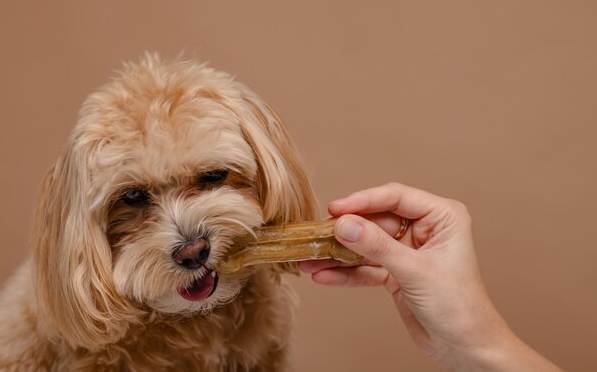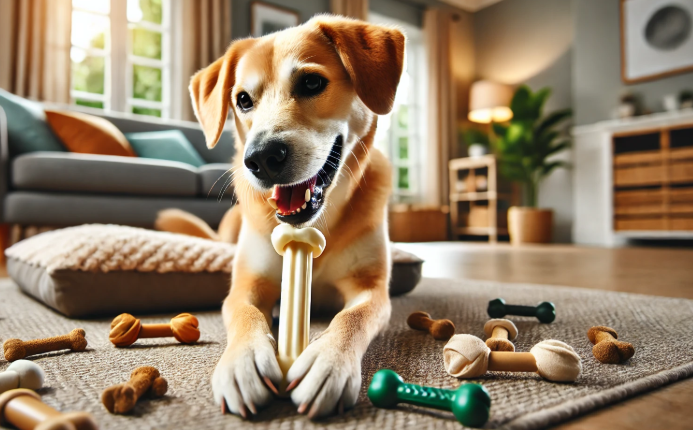As a pet parent, you know that keeping your dog’s teeth clean and healthy is just as important as feeding them nutritious meals and providing them with exercise. Dental health plays a crucial role in your dog’s overall well-being, and one of the most convenient and effective ways to maintain it is through dental treats for dogs. These specially designed snacks can help reduce plaque, tartar, and bad breath, all while providing your pup with a tasty reward.
What Are Dental Treats for Dogs?
Dental treats for dogs are specially formulated snacks designed to promote oral health. These treats help clean your dog’s teeth by reducing plaque buildup, tartar, and bad breath. They often have a unique texture, shape, and ingredients that work together to clean hard-to-reach areas in your dog’s mouth as they chew.
Many dental treats contain natural ingredients like mint, parsley, or baking soda to help freshen your dog’s breath, while others feature enzymatic formulas to break down plaque and tartar. Some treats even include added nutrients like vitamins or minerals to support your dog’s overall health.
Why Are Dog Dental Treats Important?
Maintaining your dog’s oral hygiene is essential for their overall health. Dogs are prone to dental issues, such as gum disease, tooth decay, and bad breath, which can lead to more serious health problems if left untreated. Poor dental health in dogs can contribute to systemic issues, such as heart disease, kidney problems, and diabetes. Regular brushing is vital, but dental treats can play a complementary role in your dog’s oral care routine.
Here are some key reasons why dental treats for dogs are essential:
- Prevention of Dental Diseases: Regular use of dental treats helps prevent plaque and tartar buildup, which can lead to gum disease and tooth loss.
- Better Breath: Many dog dental treats are designed to freshen your dog’s breath, making cuddle time more pleasant for both of you.
- Convenience: Dental treats are a quick and easy way to support your dog’s dental hygiene without having to worry about brushing their teeth every day.
- Promotes Overall Health: Maintaining good oral health can reduce the risk of more severe health conditions, keeping your dog healthier and happier in the long run.
How Dental Treats Help Maintain Your Dog’s Oral Health?
Dental treats for dogs work through a combination of mechanical action (chewing) and specialized ingredients that help clean the teeth and gums. Here’s how they work:
1. Mechanical Cleaning Action
The texture and design of dental treats allow them to scrape against your dog’s teeth as they chew. This action helps remove plaque and tartar that naturally build up on your dog’s teeth over time. The chewing process also massages the gums, promoting better circulation and overall gum health.
2. Enzymatic Ingredients
Many dog dental treats contain enzymes that help break down plaque and tartar. These ingredients work by loosening the buildup, making it easier for your dog’s natural chewing motion to remove the debris. Over time, this can reduce the amount of plaque on your dog’s teeth, preventing more severe dental issues.
3. Breath-Freshening Agents
Some dental treats contain natural ingredients, like parsley or mint, that help freshen your dog’s breath. These ingredients neutralize bad odors, ensuring that your pup’s breath smells fresh and clean after every treat.
4. Calcium and Phosphorus for Strong Teeth
Dental treats often include added minerals like calcium and phosphorus to support your dog’s dental structure. These minerals help strengthen teeth and bones, promoting long-term dental health.
Choosing the Right Dog Dental Treats
When selecting dental treats for your dog, it’s important to consider their size, age, and specific oral health needs. Here are some factors to keep in mind when choosing the best dental treats:
1. Size and Breed
Different dog breeds have different dental needs. Small dogs often have tighter spaces between their teeth, which can lead to plaque buildup, while larger dogs may need stronger treats to help clean their teeth. Be sure to choose dental treats that are appropriate for your dog’s size and breed.
2. Ingredients
Look for dog dental treats that contain natural, high-quality ingredients. Avoid treats with excessive fillers, artificial colors, or preservatives. Opt for treats with ingredients like parsley, mint, and enzymes that help break down plaque.
3. Dental Certification
Some dental treats for dogs come with certification from veterinary dental organizations, such as the Veterinary Oral Health Council (VOHC). These treats have been proven to reduce plaque and tartar and are a great choice for pet parents looking for trusted products.
4. Texture and Shape
The texture and shape of the treat are important for effectively cleaning your dog’s teeth. Look for treats that are designed with ridges, grooves, or a unique shape to help reach different areas of your dog’s mouth.
Best Dental Treats for Dogs Available in the USA
In the USA, several reputable brands are offering high-quality dog dental treats. Some of the best options include:
1. Greenies Dental Chews
Greenies is one of the most popular and trusted names in the dental treat market. These treats are designed to clean teeth, freshen breath, and promote oral health. They are available in various sizes to suit all breeds.
2. Virbac C.E.T. Enzymatic Oral Hygiene Chews
These chews contain enzymes that help break down plaque and tartar while also freshening your dog’s breath. They are highly recommended by veterinarians for their effectiveness.
3. Pedigree Dentastix
Pedigree Dentastix is an affordable and effective dental treatment option. Their unique shape and texture help clean teeth and reduce tartar buildup.
4. Oravet Dental Chews
Oravet is known for its long-lasting dental chews that help prevent plaque formation. These chews are specifically formulated to reduce tartar buildup over time.
How Often Should You Give Your Dog Dental Treats?
The frequency of dental treats depends on your dog’s specific needs and their overall diet. In general, giving your dog a dental treat 2-3 times a week is sufficient to maintain oral health. However, some brands recommend daily use for the best results.
Remember that dental treats should not replace regular teeth brushing or professional dental checkups. They should be used as a complementary tool to keep your dog’s teeth clean between brushing sessions.
Common Mistakes to Avoid with Dental Treats for Dogs
While dental treats are an excellent addition to your dog’s oral care routine, there are some common mistakes to avoid:
- Overfeeding Treats: Too many dental treats can lead to weight gain, so always follow the recommended serving sizes.
- Relying Solely on Treats: Dental treats should complement, not replace, regular brushing and veterinary checkups.
- Choosing Low-Quality Treats: Opt for high-quality dental treats with proven ingredients to avoid wasting money on ineffective products.
Conclusion
Incorporating dog dental treats into your pet care routine is an easy and effective way to ensure your dog’s oral health remains in top condition. These treats not only help prevent plaque and tartar buildup but also freshen your dog’s breath, promote overall health, and offer a delightful bonding moment. By choosing the right dental treats, you can help your furry friend enjoy a lifetime of healthy smiles!
FAQs
1. How often should I give my dog dental treats?
Giving your dog a dental treat 2-3 times a week is generally sufficient. However, daily use may be recommended for certain brands.
2. Can dental treats replace brushing my dog’s teeth?
Dental treats are a great addition to your dog’s oral care routine, but they should not replace regular teeth brushing. Brushing is essential for optimal oral health.
3. Are dog dental treats effective in preventing gum disease?
Yes, when used regularly, dental treats can help prevent gum disease by reducing plaque and tartar buildup.
4. Can I give dental treats to puppies?
Puppies can benefit from dental treats once they have their adult teeth. Be sure to choose treats appropriate for their age and size.
5. How do I know if a dental treat is safe for my dog?
Look for treats that have veterinary approval or certification from the VOHC. Always check the ingredient list and avoid treats with artificial additives.

